I installed Windows updates and my system supports a standard controller.
Do I need to change something in the files - drivers from you?
Or is everything fine there?
Thanks for the answer.
No.
Strange, but when installing the drivers on pm1725b, I have error code 10. But on Intel drivers were installed without problems.
Maybe someone can unsubscribe here who has the same ssd. Does your driver work?
Which specific Intel driver did you install?
Have you ever tried the mod+signed OFA driver v1.5.0.0?
64bit Intel NVMe Driver v4.3.0.1006 WHQL for Win7-10
Intel drivers that I installed.
Maybe I’m not doing something right?
@Busido_RUS :
The Intel NVMe Drivers v4.3.0.1006 WHQL for Win7-10 have been designed for Intel NVMe SSDs with an Intel NVMe Controller in it. The HardwareIDs of your Samsung SSD are natively not supported at all by these Intel drivers (neither the VendorID nor the DeviceID).
How did you get this driver installed? Does is run better than the MS in-box NVMe driver?
By the way: This thread is about mod+signed Samsung NVMe drivers.
You misunderstood.
I have 2 ssd: intel 760p and samsung.
I installed the Intel drivers without any problems.
But the drivers for the Samsung pm1725b give an error. Although I installed the certificate, the drivers give error code 10.
I decided to install the driver “New 64bit Win10 Samsung NVMe driver v2.0.8.1611 mod+signed by Fernando” , but it gave an error 10 and the disk stopped detecting.
http://images.vfl.ru/ii/1572716410/fd5fd611/28421833.jpg
But the regular update of windows and the standard controller work correctly. I just want to install your drivers with a signature in order to increase ssd speeds. But an error will constantly appear.
http://images.vfl.ru/ii/1572716209/be0a7b84/28421711.jpg
Here is a newer version of the driver, but it does not work either.
http://images.vfl.ru/ii/1572948076/21c84001/28453526.jpg
@Busido_RUS :
The newest Samsung NVMe driver is v3.2.0.1910 dated 29. Seprtember 2019, but this driver will not work either with your specific NVMe SSD.
If you want a better performance for your Samsung NVMe SSD, I recommend to try the mod+signed OFA driver v1.5.0.0, which you can find >here<. Before you are going to install it, I recommend to set a “Restore Point”.
Friend check image.
http://images.vfl.ru/ii/1573030433/56ce1ff8/28464830.jpg
The drivers installed without problems. SSD indicators increased by 5-10%.
I now think that in the original Samsung drivers for ssd pm1725b there is a mistake. Can you check again?
I do not understand why they are not installed.
As I already have written my only explanation is, that it is the driver itself (= the *.SYS file), which doesn’t support your specific NVMe SSD.
All Samsung NVMe drivers are specific ones (support just specific HardwareIDs), whereas the OFA and the MS NVMe drivers are generic ones (natively do support all NVMe Controllers regardless their HardwareIDs).
I have an OEM drive. Could there be any restrictions because of this?
I found a driver on my hard disk that I have not seen posted before and I believe best belongs in this thread, namely version 1.4.8.3 of the SM1715/PM1725 drivers originally linked to by OP. The 1.4.8.3 drivers are not necessarily very interesting by themselves other than the minor version bump; they are mostly interesting because (either by mistake or on purpose) they were released with full PDB debug symbols included. This makes it far easier to disassemble and reverse engineer these drivers than any other commercial NVMe drivers.
One thing that is immediately obvious when these drivers are viewed in a disassembler is that they are extremely similar to the OFA Community drivers. In fact, I would have guessed that the Samsung SM1715/PM1725 drivers are simply rebranded Samsung-signed versions of the OFA Community drivers, but upon closer inspection I do so see some differences, for example some differences in the handling of NVMe AERs (Asynchronous Event Requests), and several functions related to correctly dealing with hibernation which are not present in the OFA drivers. Closer inspection will probably turn up more.
Just to be clear, I’m not asking for these drivers to be signed with a modified INF or something like that. It seems that OP’s request has already been satisfied with the (newer, and probably better) v2.x drivers. But some people may be interested in analyzing these drivers without necessarily actually running them, to see what (if any) Samsung-specific changes were made compared to the OFA drivers. Another NB is that the newer Samsung “consumer” NVMe drivers are definitely not related to these in any way that I can see and were probably written by a different team. Though since the OFA Community drivers are perfectly capable of working with e.g. the Samsung 970 series drives, I am fairly certain that this also goes for these “OFA+” drivers.
The drivers (with PDBs) are attached since I cannot remember what dodgy driver site I originally found these on. But you can verify for yourself that the drivers are signed by Samsung, have not been modified, and that the PDB files match the driver binaries.
@Mattiwatti :
Welcome to the Win-RAID Forum and thanks for your very interesting contribution.
As soon as I have the required time, I will do some tests with your attached 64bit Samsung NVMe driver v1.4.8.3 dated 07/26/2016.
Regards
Dieter (alias Fernando)
@Mattiwatti :
Yesterday you made me so curious regarding the 64bit Samsung NVMe driver v1.4.8.3, that I have already started some tests.
As you know, this driver belongs to a driver generation, which has been designed by Samsung just for their Server NVMe SSDs (SM1715, XS1715, PM1725 etc.) and not for their Retail Consumer NVMe SSDs (like the 960/970 EVO series).
Accidentally I have recently done a clean install of Win10 x64 Prof. v1909 onto my 500 GB Samsung 970 EVO Plus SSD, which gave me the opportunity to do some benchmark tests with a fresh and very performant system.
Here are the benchmark results I got by using the MS in-box NVMe driver (left Pic) and the Samsung NVMe driver v3.2.0.1910 WHQL (right Pic):
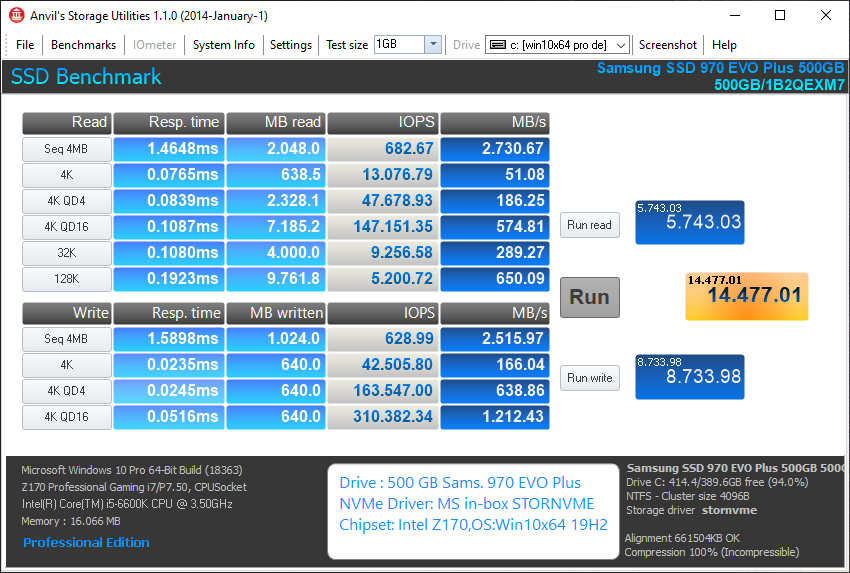
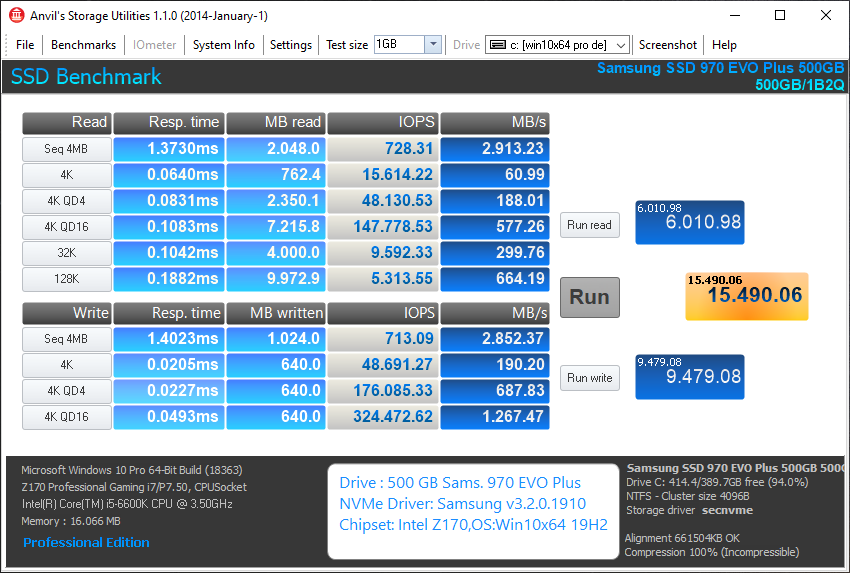
As first step I modified the nvme.inf file of the 64bit Samsung NVMe driver v1.4.8.3 dated 07/26/2016 to make it usable with my NVMe SSD resp. its Controller and gave the modded driver a digital signature.
After having set a “Restore Point”, I installed this freshly mod+signed driver manually without any problem. It was taken by the OS automaticly after I had chosen the option “Browse my computer…” and navigated to the driver folder (no need to force the installation).
Encouraged by the results (see below picture), I tried to make this specific driver usable as generic NVMe driver, which may support all NVMe Controllers (no matter, who was the manufacturer and which was the model of the SSD).
After having done the related INF file modifications and given the driver a digital signature, I tried to get this AIO NVMe driver installed - and succeeded at first attempt!
Here are the benchmark results I got with the mod+signed Hardware-specific (left Pic) and generic 64bit Samsung NVMe driver v1.4.8.3 (right Pic):
[[File:Z170-500GB970EVOPLUS-NVMe-Samsung1483m+s-PCIe-19H2.png|none|500px]][[File:Z170-500GB970EVOPLUS-NVMe-genericSamsung1483m+s-PCIe-19H2.png|none|500px]]
Since this success had blown wind under my wings, I searched for newer Samsung NVMe drivers with a similar structure and identical SYS file name nvme.sys. The latest ones I found were the NVMe drivers v2.0.8.1611 dated 11/15/2016.
Then I did similar modifications with the 64bit Samsung NVMe driver v2.0.8.1611 and installed them as well successfully.
These were the results I got while running the specific (left Pic) and the generic (right Pic) 64bit Samsung NVMe driver v2.0.8.1611:
[[File:Z170-500GB970EVOPLUS-NVMe-Samsung2081611m+s-PCIe-19H2.png|none|500px]][[File:Z170-500GB970EVOPLUS-NVMe-genericSamsung2081611m+s-PCIe-19H2.png|none|500px]]
My conclusion:
My results verify, what you already have predicted yesterday: The old Samsung NVMe drivers named nvme.sys, which were designed for Samsung’s Server NVMe SSDs, seem to be as well a very good choice for all other Samsung NVMe SSDs.
Contrary to the OFA drivers the NVMe SSD is not shown by the OS as beeing safely removable.
It has to be investigated by further tests, whether even non-Samsung NVMe Controllers are supported by the mod+signed generic variants of the Samsung NVMe drivers v1.4.8.3 and v2.0.8.1611.
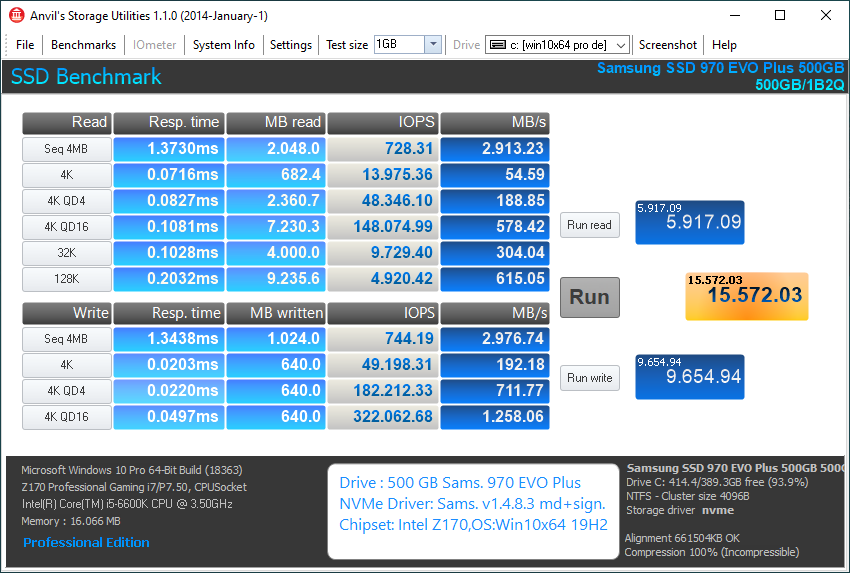
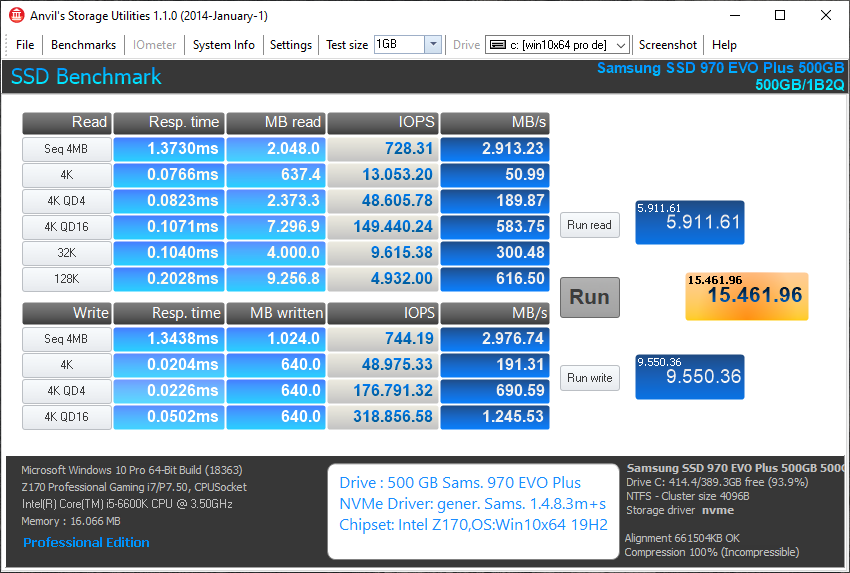
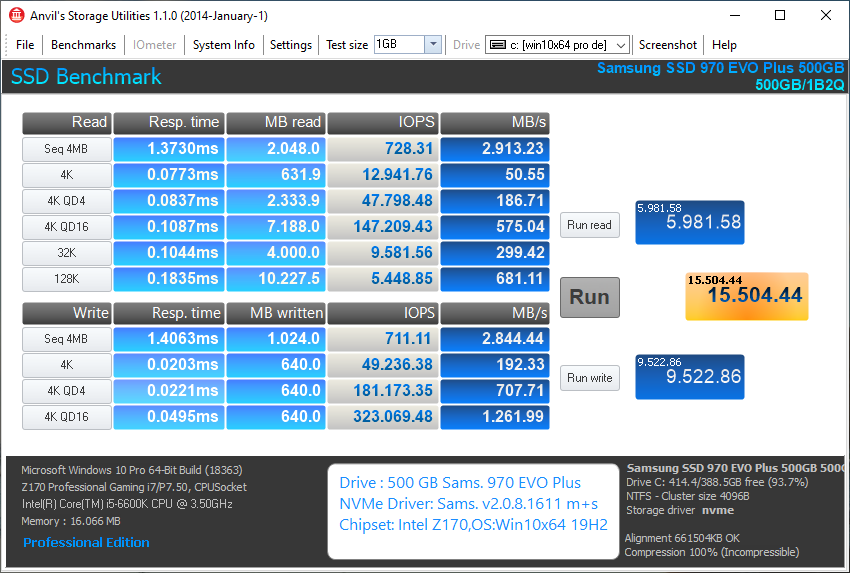
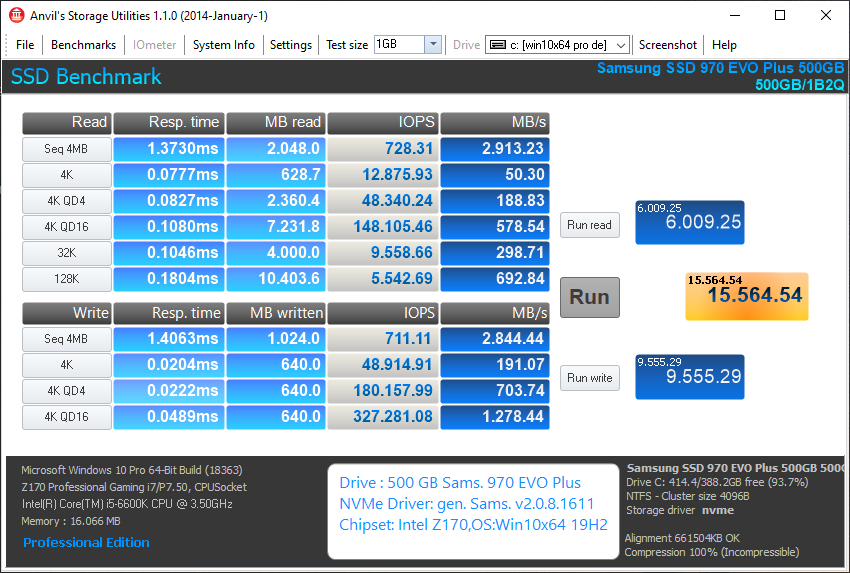
Without drivers, my SSD is gaining only 12,000 points in this Anvil’s Storage Utilities.
Can you still make drivers for my controller?
I still can not understand why my SSD does not want to use drivers for the controller.
@Busido_RUS :
Without any NVMe driver your NVMe SSD wouldn’t work at all.
The Windows 10 in-box NVMe driver is good and will run automaticly after the installation of the OS.
If you want to install another NVMe driver, you have to update the software for the NVMe Controller (listed within the “Storage Controllers” section of the Device Manager) and not the driver of the NVMe SSD (listed within the “Disk drives” section)!
Yesterday I have tested it with a 400 GB Intel 750 NVMe SSD.
Result: The generic variant of the mod+signed 64bit Samsung NVMe driver v2.0.8.1611 could be installed properly and was running without any problems with the Intel NVMe Controller of the Intel SSD.
Side Note: The benchmark scores were much lower than those I got with the latest Intel NVMe driver v4.4.0.1003 WHQL, but this was no surprise for me.
Conclusion: Users with a Samsung NVMe SSD, who don’t want to use the generic MS Win10 in-box NVMe driver, should prefer NVMe drivers from Samsung (or OFA).
What drivers can I try for my own samsung pm1725b ?